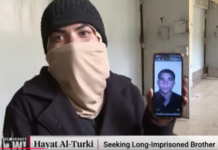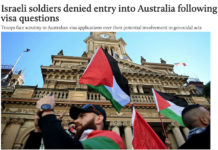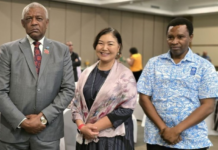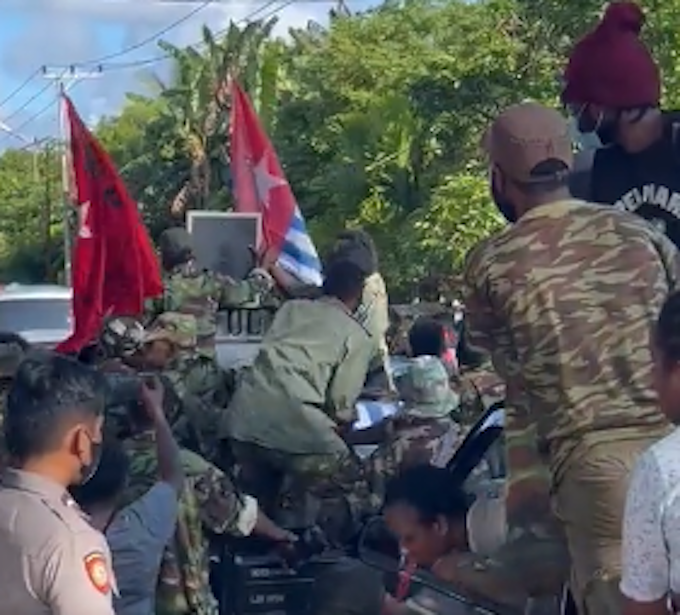
By David Robie
A tragic day of mourning. Thousands thronged the West Papuan funeral cortège today and tonight as the banned Morning Star led the way in defiance of the Indonesian military.
There haven’t been so many Papuan flags flying under the noses of the security forces since the 2019 Papuan Uprising.
Filep Jacob Semuel Karma, 63, the “father” of the Papuan nation, was believed to be the one leader who could pull together the splintered factions seeking self-determination and independence.
- READ MORE: Papuan ex-political prisoner Filep Karma found dead on Jayapura beach
- Filep Karma’s death as reported in Tabloid Jubi – Bahasa Indonesian
- Papuan activist dies in ‘apparent diving incident’ in Jayapura
- Filep Karma: A Papuan human rights hero and huge loss to the Pacific
- Other Filep Karma reports
It is still shocking a day after his lifeless body in a wetsuit was found on Jayapura’s Base-G beach.
Police and Filep Karma’s family say they had no reason to believe that his death resulted from foul play, report Jubi editor Victor Mambor in Jayapura and Nazarudin Latif from Jakarta for Benar News.
“I followed the post-mortem process and it was determined that my father died from drowning while diving,” Karma’s daughter, Andrefina Karma, told reporters.
But many human rights advocates and researchers aren’t so convinced.
Speculation on reasons
Some are speculating about the reasons why peaceful former political prisoner Filep Karma was perceived to be an obstruction for Jakarta’s “development” plans for the Melanesian provinces.
“There were too many strange circumstances around his death and questioning police’s influence on the family. We are not accepting this as an accident,” declared Indonesian human rights Veronica Koman in a tweet.
Human rights lawyers for West Papua are solid that there were too many strange circumstances around his death and questioning police’s influence on the family. We are not accepting this as an accident. https://t.co/bfOcMvNpha
— Veronica Koman 許愛茜 (@VeronicaKoman) November 2, 2022
She says Filep Karma was so respected by West Papuans that he could have unified all factions.
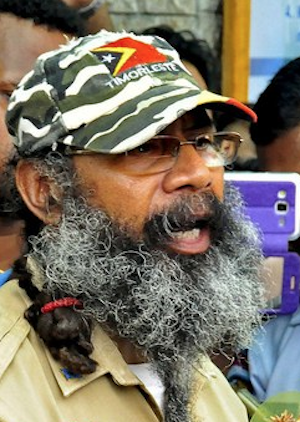
“He was a father of the nation in the making – similar to Theys Eluay who was assassinated in 2001,” she said.
“Indonesia would like to prevent this. An independent investigation must take place into his death.”
Koman noted that while Indonesian human rights defenders shared their condolences, there was silence from the Jakarta state establishment.
Amnesty International has also called for an independent investigation.
Tributes pour in
Tributes have poured in from many of his friends, colleagues and fellow activists across Indonesia and the Pacific.
Indonesia researcher Andreas Harsono of Human Rights Watch wrote: “Filep Karma’s humour, integrity, and moral courage was an inspiration to many people. His death is a huge loss, not only for Papuans, but for many people across Indonesia and the Pacific who have lost a human rights hero.”
The Diplomat’s Southeast Asia editor Sebastian Strangio wrote: “Karma trod a path that avoided the extremes of violent rebellion and acquiescence to what many Papuans view as essentially foreign rule.
“Whether this approach ever would have achieved Karma’s long-held goal of independence and autonomy for the Papuan people is unclear, but his passing will clearly leave a large vacuum.”
He was a former civil servant who, dismayed at how many Indonesian state officials treated West Papuans, spurned a good salary to dedicate his life to West Papua.
Although standing for “justice, democracy, peace and non-violent resistance, he was jailed for 11 years for raising the Morning Star flag.
One of the most comprehensive tributes to Karma was offered by Benny Wenda, leader of the United Liberation Movement for West Papua (ULMWP), saying that the day was a “national day of mourning for the West Papuan people — all of us, whether in the bush, in the cities, in the refugee camps, or in exile”.
‘Great leader’
“Filep Karma was a great leader and a great man,” says Wenda.
“Across his life, he held many roles and won many accolades — he was a ULMWP Minister for Indonesian and Asian affairs, a Nobel Peace Prize nominee, and the longest serving peace advocate in an Indonesian jail.
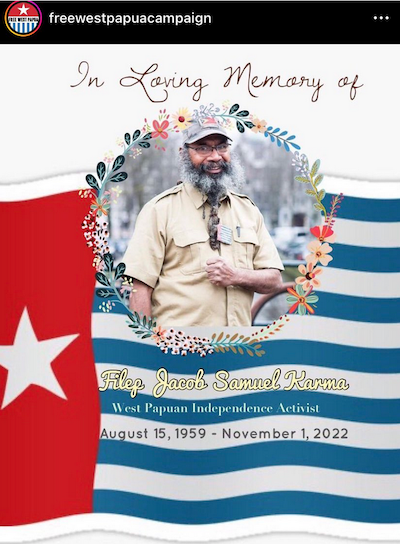
“But he was first of all a frontline leader, present at every single protest, reassuring and inspiring all West Papuans who marched or prayed with him.
“Filep was there at the Biak Massacre in 1998, when 200 Papuans, many of them children, were murdered by the Indonesian military. Despite being shot several times in the leg that day, his experience of Indonesian brutality never daunted him.
“He continued to lead the struggle for liberation, whether in prison or in the streets.
“For West Papuans, Filep was equivalent to Mahatma Gandhi, Nelson Mandela, Martin Luther King.
“The history of our struggle lived within him.”
‘How did he die?’
Now Benny Wenda says: “The big question is this: how did Filep die?” (He reportedly died while surfing despite being a skilled diver.)
“Indonesia systematically eliminates West Papuans who fight against their occupation. Sometimes they will kill us in public, like Theys Eluay and Arnold Ap, who was murdered and his body dumped on the same beach Filep died on.”
But Wenda adds, it is more common for West Papuans to “die in mysterious ways” or face character assassination, as in the case of Papua Governor Lukas Ensemble.
Filip Karma was a courageous and inspirational man of peace.
However, tonight at the funeral procession in Jayapura, many have been singing:
“Because Papua wants to be free. . .
“Indonesia likes to kill people . . .
“Indonesia likes to shoot people…”
West Papua – 5.35pm pic.twitter.com/csX8gLsUKB
— Veronica Koman 許愛茜 (@VeronicaKoman) November 2, 2022



